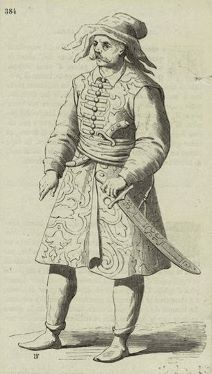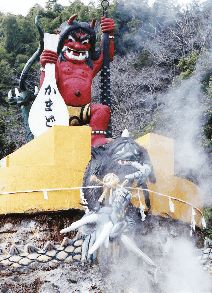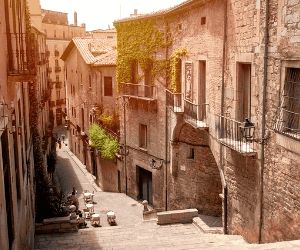Revisited
Words From National Character

|
Editor's note: This article is a reprint from "Stories That Words Tell Us" By Elizabeth O'Neill. It was originally published in 1918. There is one group of metaphorical words which is specially interesting for the stories of the past which they tell us if we examine into their meaning. Many names of ancient tribes and nations, and some names of modern peoples, have come to be used as general words; but the new meanings they have now tell us what other peoples have thought of the nations bearing these names in history. One of the best things that can be said about a boy or a girl is that he or she is "frank," by which we mean open and straightforward. The Franks were, of course, the Teutonic tribe which conquered Gaul (the country we now call France) in the sixth century. Unlike the English when they conquered the Britons, the Franks mixed with the Gauls and the Roman population which they conquered; but for a long time the Franks were the only people who were altogether free. From this fact the word frank came into use, meaning "free." A "frank" person is one who speaks out freely and without restraint.  Statue of barbarian king imprisoned. Notice the thick beard The name Frank has given us a word with a very pleasant meaning, but this was not the case with all the Teutonic tribes which broke in upon the Roman Empire. A person who is very uncivilized in his manners is sometimes called a "Goth." The word is often especially used to describe a person who does not appreciate pictures and books and works of art. Sometimes architects will pull down beautiful old buildings to make place for new, and the people who appreciate beautiful things describe them as "Goths." More often, perhaps, the word Vandal is used to describe such people. The Goths and Vandals were two of the fiercest and most barbaric of the German tribes which overran the Roman Empire from the third to the fifth century. They showed no respect for the beautiful buildings and the great works of art which were spread over the empire. They robbed and burned like savages, and in a few years destroyed many of the beautiful things which had been made with so much care and skill by the Greek and Roman artists. So deep an impression did their destructiveness make on the world of that time that their names have been handed down through sixteen centuries, and are used to-day in the unpleasant sense of wilful destroyers of beautiful things. The words barbarian and barbarous are used in the same way. We describe a child who behaves in a rough way as "a little barbarian," or a grown-up person without ordinary good manners as "a mere barbarian." And the word barbarous has an even worse meaning. It is used to describe very coarse, uncivilized behaviour; but most often it has also the sense of cruelty as well as coarseness. Thus we speak of the barbarous behaviour of the Germans in Belgium. But when the word barbarous was first used it meant merely "foreign." But the original assassins were an Eastern people who believed that the murder of people of a religion other than their own was pleasing to their God. To the Greeks there were only two classes of people--Greeks, and non-Greeks or "barbarians." The name barbarian meant a bearded man, and came from the Greek word barbaros. The Greeks were clean-shaven, and distinguished themselves from the "bearded" peoples who knew nothing of Greek civilization. The Romans conquered Greece, and learned much from its civilization. To them all who were not Greeks or Romans were "barbarians." Some Roman writers, like Cicero, use the word in the modern sense of unmannerly or even savage, but this was not a common use. St. Paul was a Roman citizen, for he belonged to Tarsus, a city in Asia Minor which had been given full Roman rights; but he was a Greek by birth, and he uses the word in the Greek way. He speaks of all men being equal according to the Christian religion, saying, "There is neither Greek nor ... barbarian, bond nor free."  Depiction of a Turk in the 16th century The word slave, again, contains in itself whole chapters of European history. It comes from the word Slav. The Slavs are the race of people to which the Russians, Poles, and many other nations in the East of Europe belong. The Great War has been partly fought for the freedom of the small Slav nations, of which Serbia is one. The Slavs have a long history of oppression and tyranny behind them. They have been subject to stronger nations, such as the Turks, and, in Hungary, the Magyars. The first "slaves" in mediæval Europe belonged to this race, and the word "slave" is only another form of Slav. The word gives us an idea of the impression which the misfortunes of the Slavs made on the people of the Middle Ages. The words Turk and Tartar have almost the opposite meaning to slave when they are used in a general sense. We call an unmanageable baby a "young Turk," and in this expression we have the idea of all the trouble the Turks have given the people of Europe since they swarmed in from the East in the twelfth century. The word Turk in this sense is now generally used amusingly to describe a troublesome child; but a grown-up person with a very quick temper or very difficult to get on with is often described also, chiefly in fun, as a "Tartar." Tartar is the name of the race of people to which the Turks, Cossacks, and several other peoples belong. The name by which they called themselves was Tatar; but Europeans changed it to Tartar, from the Latin word Tartarus, which means "hell." This gives us some idea of the impression these fierce people made on mediæval Europe--an impression which is kept in memory by the present humorous use of the word.  Statue of a Japanese ogre It is chiefly Eastern peoples whose names have passed into common words meaning fierce and cruel people. Our fairy tales are full of tales of "ogres." It is not quite certain, but it is probable that this word comes from Hungarian. The chief people of Hungary are the Magyars; but the first person who used the name Hungarian in the sense of "ogre" probably did not know this, but thought of them as Huns, or perhaps Tartars, and therefore as very fierce, cruel people. The first person who is known to have used it is Perrault, a French writer of fairy tales in the seventeenth century. The Great War has given us another of these national names used in a new way. Many people referred to the Germans all through the war as the "Huns." The Huns were half-savage people, who in the early Middle Ages moved about in great hordes over Europe killing and burning. They were at last conquered in East and West, and finally disappeared from history. But their name remained as a synonym for cruelty. The Kaiser, in an unfortunate speech, exhorted his soldiers to make themselves as terrible as Huns; and when people heard of the ill-treatment of the Belgians when their country was invaded at the beginning of the war, they said that the Germans had indeed behaved like the Huns of long ago. The name clung to them, and during the war, when people spoke of the "Huns," they generally meant the Germans, and not the fierce, half-savage little men who followed their famous chief Attila, plundering and burning through Europe about fifteen centuries ago. |
| Revisited - Words From National Character | ||||
| Writer: | Elizabeth O'Neill | |||
| Images: | ||||
| ||||
| Sources: | ||||
| ||||
All images are Copyright - CC BY-SA (Creative Commons Share Alike) by their respective owners, except for Petey, which is Public Domain (PD) or unless otherwise noted.
comments powered by Disqus



















